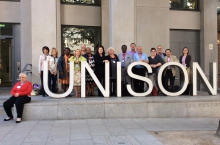Nurse-to-patient ratios save lives!

Health unions gathered in London raise alarms for all people in the UK and for health and social services unions around the world
Universal access to quality health and social care services should be among the central priorities of all governments, as these services underpin human rights and quality of life. Current trends of austerity budgets, privatisation and outsourcing as well as renewed structural adjustment policies are making the attainment of universal access to health and social care services more difficult.
On International Nurses’ Day 2015, the global trade union federation Public Services International – PSI, representing 20 million workers in 160 countries, warns of threats to patient and family care from increasing privatisation, outsourcing and funding cuts in health and social services. Under these conditions, our members, and especially nursing professionals, are unable to deliver safe and reliable health services. Patients deserve better than this. Health workers deserve better.
PSI’s working group of health unions and invited experts met at UNISON headquarters on 11 and 12 May. After reviewing the research from many countries, the group concluded that most current approaches to staffing in health are failing and there is compelling evidence that patients are paying a high price in terms of harm and sub-optimal outcomes. PSI calls on governments, the UN system and health and social service operators to implement safe staffing policies to ensure that patients get the care they deserve.
Safe staffing through nurse-patient ratios is a proven method to ensure that the necessary staff are available when needed. There is ample evidence that patients are exposed to unnecessary health and vital risks when nurse-to-patient ratios fall below safe levels. Mandated minimum staff-to-patient ratios save lives, by setting standards below which care must not fall.
PSI supports the UK affiliates’ criticisms of health sector policies, especially the systemic risks posed by privatisation in health and social services, known as the Private Finance Initiative model. In an effort to conceal state borrowing, the government uses the Private Finance Initiative model to attract much more expensive private financing. The real impact of the Private Finance Initiative model is felt only after a few years, when hospital trusts are forced to cut heavily into operating and staff costs or face bankruptcy. Unions insist that government not sell off our future for short-term accounting tricks.
PSI is putting governments and health and social service operators on notice. Safe staffing and the achievement of nurse-to-patient ratios will be central to all of our activities, whether in rich, middle-income or disadvantaged countries. Unions will pressure and negotiate for measures to protect patient care.
For more information on the PSI working group on Safe and Effective Staffing for Health (SESH) see:
Report of the SESH Working Group meeting
Background brief of the SESH Working Group meeting
Presentations:
- Beth Mohle, Queensland Nurses Union (Australia)
- Jane Alison Lawless, Consultant Expert, SESH (Presentation 1 - Presentation 2)
- Jane Ball, University of Southampton (UK)
- Kelly D. Trautner, American Federation of Teachers (USA)
- Odile Frank, Public Services International
- Peter Griffiths, University of Southampton (UK)
- Robert Bonner, Australian Nursing and Midwifery Federation (SA Branch, Australia)
- Liza Di Paolo Sandber, Swedish Municipal Workers Union (Sweden)
- Lisa Fitzpatrick, Australian Nursing and Midwifery Federation (Victoria Branch, Australia)
- Alison Leary, Independent health consultant and researcher (UK)

